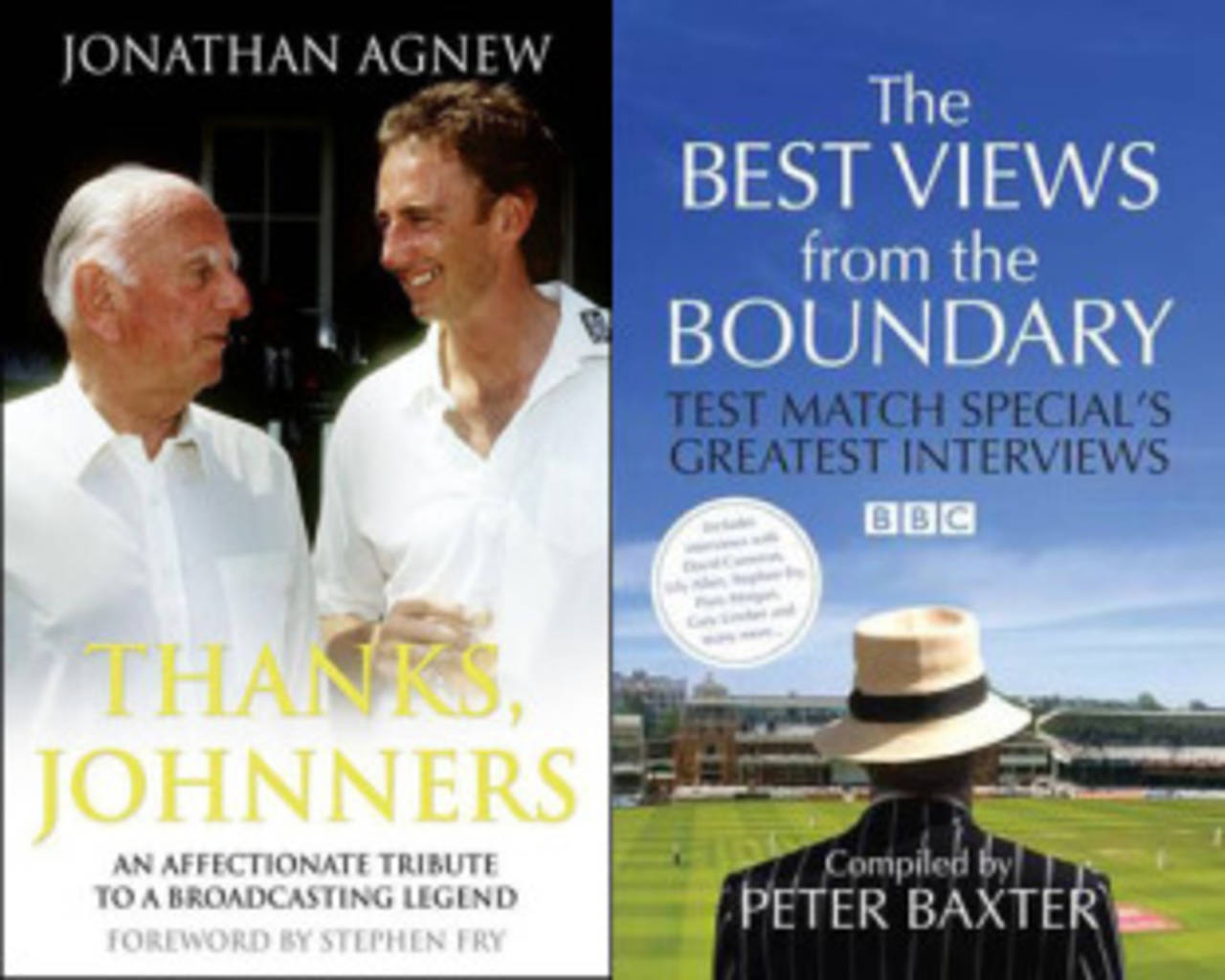A soap opera we enjoy
Two books on Test Match Special highlight the show's humour and charm as well as its tendency to celebrate itself more than the game
Michael Billington
11-Dec-2010

Blue Door and Corinthian Books
Between them, Brian Johnston and Test Match Special have created a light industry. The shelves are full of books by and about the imperishable Johnners. We have been taken countless times behind the scenes at TMS, most recently by Peter Baxter. The programme even, for a while, created its own travelling roadshow. But while these two new books are both diverting and highly readable, the former reminds us of the danger of TMS falling into the self-mythologising trap; of believing it is somehow bigger than the game it is there to celebrate.
Jonathan Agnew's book is a curious hybrid: a heartfelt tribute to the author's friend and mentor,
Brian Johnston, but also a ball-by- ball account of Agnew's own transformation from Leicestershire paceman to TMS frontman. On both subjects it has many interesting things to say. Agnew faithfully recalls BJ's love of pranks, double entendres and verbal mischief (at one point the Pakistan fast bowler Asif Mahood Spoonerishly became "Massive Arsehood") while noting his reluctance ever to talk about his wartime heroism. When it comes to his own career, Agnew rather poignantly says that he played for England when he probably shouldn't have and didn't play when he probably should have.
For all its split purpose, I enjoyed Agnew's book; and it is fascinating to get a glimpse of the occasional tension behind the bubbly bonhomie of TMS. Agnew's own introduction to the programme came during the West Indies series of 1991 when Don Mosey was about to launch an attack on his fellow commentators, when a TMS dinner erupted in chaos with a fierce row between Fred Trueman and Micky Stewart and when Pat Murphy's refusal to toast the Queen nearly prompted Johnston's resignation.
Harmony was quickly restored and TMS soon settled down again. But Agnew unwittingly puts his finger on the problem facing it today when he writes: "TMS is much more than just the radio commentary on a cricket match: it is more like a soap opera." For some of us it is currently too much like a soap opera.
Commentators, not least Agnew himself, often tell us more about their domestic life and dining
arrangements than about the cricket; summarisers butt in after every ball; and anecdote often
takes precedence over analysis. You sometimes feel that the game exists to serve TMS rather than the other way round. In an extraordinary passage Agnew attacks UDRS (Umpire Decision Review System) on the grounds that "it kills the commentary stone dead". I'd have thought it's more important that on-field errors should be rectified than that commentators should have to suffer momentary inconvenience. As a personal tribute to Johnston, Agnew's book is admirable; but it also illustrates, with no fewer than 18 pages on the well-documented "leg-over" joke, the danger of TMS lapsing into self-regard.
One of the programme's happiest features, however, has been the lunchtime View From The Boundary, and Peter Baxter has now selected 25 of the best ranging over actors, pop stars, politicians, newspapermen and royals. Johnston conducted many of them and had the great gift of establishing an instant rapport with his subject. The book starts with his classic 1980 interview with Ben Travers, who was 94 at the time and who effortlessly recalls the great players of his youth: he paints a vivid picture of the way WG would plant his left heel on the ground and cock his toe up. As a natural vaudevillian Johnners was also very much at ease with performers: I roared aloud at Michael Bentine's cdescription of the way, after he had endlessly destroyed models of the BBC Television Centre on It's a Square World, a memo went round saying, "Under no circumstances must the BBC Television Centre be used for the purposes of entertainment". One or two of the interviews fall flat when read: John Paul Getty Jr simply emerges as a loyal fan and even Agnew's encounter with Lily Allen, which caused a stir at the time, is not that remarkable on the page. But the bulk of the interviews are richly revealing. Henry Blofeld proves totally at ease with Dennis Skinner who is rightly impassioned about the sale of school cricket fields, Agnew gets Stephen Fry to talk eloquently about the links between cricket and the English language and, best of all, the underrated Simon Mann relishes an abrasive encounter with Piers Morgan who tests to the limit the theory that cricket lovers are invariably nice people; in fact, reading that interview I was reminded of Fry's wicked definition of "countryside" as "killing Piers Morgan". But the joy of Baxter's book is that it communicates a love of cricket and shows why, whatever its flaws, we still need TMS.
Thanks Johnners
by Jonathan Agnew
Blue Door (hardback)
244pp, £20

by Jonathan Agnew
Blue Door (hardback)
244pp, £20
The Best Views from the Boundary
by Compiled by Peter Baxter
Corinthian Books (hardback)
312pp, £14.99

by Compiled by Peter Baxter
Corinthian Books (hardback)
312pp, £14.99
Michael Billington is the Guardian's theatre critic